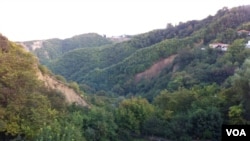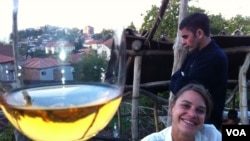SIGHNAGHI, GEORGIA —
Six years ago, Russia hit Georgia with a wine embargo. Suddenly, a market that had taken 80 percent of Georgia’s wine exports was closed.
Now, in the days after Georgians elected a Moscow-trained prime minister, there is serious talk of lifting the embargo.
In Sighnaghi, a 120-kilometer drive east of Tbilisi, some winemakers say they have adjusted to business without the massive Russian market.
Here in the eastern hills of Georgia, archeologists say they have found the earliest evidence of grape cultivation and winemaking in the world. Eight-thousand years ago, wine was made in kvevri - massive clay jars lined with beeswax and buried in the ground.
A Renaissance is Born
John Wurdeman, an American, is following the old ways making his Pheasant's Tears wines.
“We are at the beginning of this renaissance,” Wurdeman said after showing visitors his vineyards and kvevri pots. “There’s a lot of work left to be done, and much of it’s education. It’s teaching people that you can work naturally and spend a little bit more time in the vines and a little bit less time fussing around in the cellar, that if you have really healthy grapes, the grapes don’t need much help.”
He has test-planted 340 varietals in one vineyard. He promotes Pheasant’s Tears with tours, wine tastings and sales through his bilingual English-Georgian website.
Georgia’s surge in quality is drawing European and American buyers, like Lisa Costa, owner of a wine bar and shop near San Francisco.
“We find a lot of character, a lot of uniqueness,” she said after a wine-tasting. “People like John are trying to save the tradition, and these ancient varietals and ancient methods. The wine speaks for itself.”
From this small Black Sea nation, Georgian wine is now sold to 50 countries around the world. That is because Russian President Vladimir Putin in 2006 abruptly banned all wine imports from pro-Western Georgia. Wurdeman recalled that Georgia had depended on Russia to buy 80 percent of its exports.
“Five years ago, it was almost impossible, or six years ago, to find a traditionally made Georgian wine outside of Georgia,” he said. Now, he added, “There’s wines showing up on the shelves in Paris, San Francisco, New York, Tokyo, and part of the exploration is this living, ancient method. Part of it is just the sheer flavor that they taste very different.”
Ancient Tradition Thrives
Quality has improved so sharply that Georgia now exports one-third of the volume of bottles as before the embargo -- but earns the same amount of money.
Next week, in a political change, Georgia is to have a new prime minister, Bidzina Ivanishvili, a billionaire. He made his fortune in Russia, and Russian wine importers are betting the embargo will be dropped. They are calling Wurdeman to make deals.
“The danger of the Russian market reopening is it will be an invitation to people to just want huge amounts of lesser quality wine,” Wurdeman warned. He said wine has been an integral part of Georgian culture for thousands of years. Russia is only starting to evolve from a hard-drinking vodka culture.
“The whole wine culture needs some time in Russia to develop,” he continued. “If it was up to me, I would keep the boycott on, and in five to 10 years, there’s going to be so many good little producers in Georgia that have a really secure place in the real wine market. Then Georgia wouldn’t have to always be blackmailed.”
Jacques Fleury is a French winemaker who directs Chateau Mukhrani, another Georgian boutique winery. Speaking in a Tbilisi wine shop, he said the Russian embargo “has brought back the Georgian industry to a high-level of quality, because we have to expand in the Western world, and there was more concern about the quality.”
Officially, Russia bans Georgian wines for health reasons. But Fleury said that Russian wine-drinkers do not share that concern. “From what I see, people taking the ferry boat from St. Petersburg, going to Estonia buying our wines, or to Finland buying our wines, and bringing back boxes of Georgian wines into Russia, I would think that there is still a great interest,” said the winemaker.
Now it is up to Russia’s Federal Consumer Protection Service to rediscover what Georgians have known for thousands of years - that a glass of wine from these ancient hills can be good for your health.
Now, in the days after Georgians elected a Moscow-trained prime minister, there is serious talk of lifting the embargo.
In Sighnaghi, a 120-kilometer drive east of Tbilisi, some winemakers say they have adjusted to business without the massive Russian market.
Here in the eastern hills of Georgia, archeologists say they have found the earliest evidence of grape cultivation and winemaking in the world. Eight-thousand years ago, wine was made in kvevri - massive clay jars lined with beeswax and buried in the ground.
A Renaissance is Born
John Wurdeman, an American, is following the old ways making his Pheasant's Tears wines.
“We are at the beginning of this renaissance,” Wurdeman said after showing visitors his vineyards and kvevri pots. “There’s a lot of work left to be done, and much of it’s education. It’s teaching people that you can work naturally and spend a little bit more time in the vines and a little bit less time fussing around in the cellar, that if you have really healthy grapes, the grapes don’t need much help.”
He has test-planted 340 varietals in one vineyard. He promotes Pheasant’s Tears with tours, wine tastings and sales through his bilingual English-Georgian website.
Georgia’s surge in quality is drawing European and American buyers, like Lisa Costa, owner of a wine bar and shop near San Francisco.
“We find a lot of character, a lot of uniqueness,” she said after a wine-tasting. “People like John are trying to save the tradition, and these ancient varietals and ancient methods. The wine speaks for itself.”
From this small Black Sea nation, Georgian wine is now sold to 50 countries around the world. That is because Russian President Vladimir Putin in 2006 abruptly banned all wine imports from pro-Western Georgia. Wurdeman recalled that Georgia had depended on Russia to buy 80 percent of its exports.
“Five years ago, it was almost impossible, or six years ago, to find a traditionally made Georgian wine outside of Georgia,” he said. Now, he added, “There’s wines showing up on the shelves in Paris, San Francisco, New York, Tokyo, and part of the exploration is this living, ancient method. Part of it is just the sheer flavor that they taste very different.”
Ancient Tradition Thrives
Quality has improved so sharply that Georgia now exports one-third of the volume of bottles as before the embargo -- but earns the same amount of money.
Next week, in a political change, Georgia is to have a new prime minister, Bidzina Ivanishvili, a billionaire. He made his fortune in Russia, and Russian wine importers are betting the embargo will be dropped. They are calling Wurdeman to make deals.
“The danger of the Russian market reopening is it will be an invitation to people to just want huge amounts of lesser quality wine,” Wurdeman warned. He said wine has been an integral part of Georgian culture for thousands of years. Russia is only starting to evolve from a hard-drinking vodka culture.
“The whole wine culture needs some time in Russia to develop,” he continued. “If it was up to me, I would keep the boycott on, and in five to 10 years, there’s going to be so many good little producers in Georgia that have a really secure place in the real wine market. Then Georgia wouldn’t have to always be blackmailed.”
Jacques Fleury is a French winemaker who directs Chateau Mukhrani, another Georgian boutique winery. Speaking in a Tbilisi wine shop, he said the Russian embargo “has brought back the Georgian industry to a high-level of quality, because we have to expand in the Western world, and there was more concern about the quality.”
Officially, Russia bans Georgian wines for health reasons. But Fleury said that Russian wine-drinkers do not share that concern. “From what I see, people taking the ferry boat from St. Petersburg, going to Estonia buying our wines, or to Finland buying our wines, and bringing back boxes of Georgian wines into Russia, I would think that there is still a great interest,” said the winemaker.
Now it is up to Russia’s Federal Consumer Protection Service to rediscover what Georgians have known for thousands of years - that a glass of wine from these ancient hills can be good for your health.











